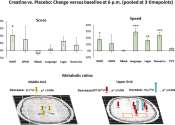Creatine found to improve cognitive performance during sleep deprivation
Creatine is a popular dietary supplement in the sports community that is used to improve physical performance. Researchers at Forschungszentrum Jülich have now discovered that a high single dose of creatine can temporarily ...
Apr 25, 2024
0
92









